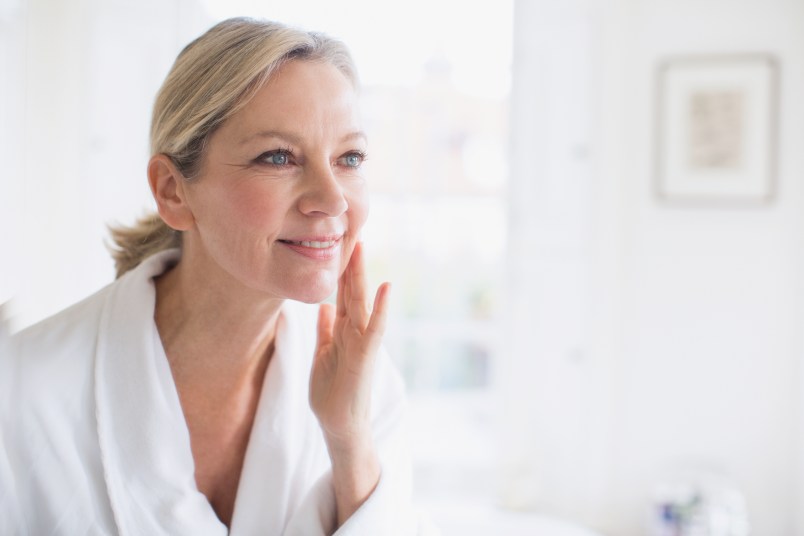11 Things Dermatologists Want You to Know About Your Skin

If your bathroom is filled with blemish-busting acids and powerful vitamins, you might think you’re on top of your skincare game. But if you’re still suffering from breakouts, dry patches, and dark circles, chances are something isn’t working.
Perhaps you’re switching formulas too quickly or working against your natural skin cycle, according to Dr. Sam Bunting, a leading cosmetic dermatologist. Here are the insider skincare rules you need to start living by.
1. Don’t deplete your skin before you get started.
Tried every trick in the skincare bible but still fighting blackheads? It’s possible you’re overusing products, or combining tools with formulas that are overworking the skin. “Try to avoid aggressively foaming cleansers and irritant physical scrubs, and don’t over use cleansing brushes or flannels if you plan on using active ingredients like acids and retinol,” says Bunting.
2. SPF is the best for anti-aging.
“It always amazes me how many people miss this step or think that they can rely on a bit of SPF in their tinted moisturizer, when in fact 90 percent of skin aging is UV-related,” says the cosmetic dermatologist. If you’re using double-duty formulas such as primer, use them properly. “1/4 teaspoon for your face is the right amount, no matter what the product.”
3. Give products enough time to do their thing.
Your skin’s natural cycle is six weeks, and if you don’t already, it’s time to start working with it. According to Bunting: “When you try a new product designed to tackle common issues like pigmentation or fine lines, know that it’s probably going to take at least one, if not two skin cycles to have an impact. So be patient!”
4. Don’t skip moisturizer.
A recent study by Bunting Skincare found that 55 percent of the people surveyed avoided using moisturizer altogether for fear of breaking out. “It’s a HUGE problem. Many anti-aging products are provocative to those with a tendency to acne because they contain ingredients like essential oils, so look for the label ‘non-comedogenic’ to dodge this pitfall,” Bunting advises.
5. Sensitive skin needs a special approach.
“Strip out unnecessary irritants like fragrance and alcohol, add in new products one at a time, and handle with great care in winter when harsh weather is a challenge to your barrier,” Bunting says. This is super-important if you have sensitive skin or experience redness.
6. Don’t assume every trend is right for you.
Obsessing over the latest formulas that promise to tighten and brighten? They might not be compatible with your complexion. “I see a lot of women in my clinic who are extremely enthusiastic about skincare. They hop on every new launch, investing so much cash and energy, changing products on an almost nightly basis, and end up confused when the result is dull, bumpy, irritated skin,” reveals Bunting. Her advice? Be discriminating — and remember, you know your skin best.
7. Follow the right influencers.
It’s easy to be swayed on social media, but not all recommendations will be right for you. “An upside of social media is the wonderful, inclusive sharing of beauty experiences — we’ve seen that extend into real life with our Bunting Skincare Club events. But the downside can be that sometimes it’s easy to be influenced by another’s opinion, even though their credentials are simply that they’ve tried a product and liked it for themselves.”
8. Invest in the right products.
“The formulas that make the biggest difference to your skin are leave-on products — these are the ones that are worth the investment,” reveals Bunting. She encourages people to spend a little more on sunscreen that glides on like a dream, so you start to apply it daily. “A mask or a cleanser, by contrast, will have less impact and can therefore be more affordable.”
9. Be rational when working with problem skin.
If you’re suffering from adult acne, turns out you’re not alone. “We’re in the grip of an acne epidemic — as many as 50 percent of grownup women will experience blemishes,” Bunting reveals. She recommends using a logical approach by creating “a structured routine based on a retinoid for night and an anti-inflammatory agent, like salicylic acid, for day.”
10. Know when to get help.
Scarring affects a massive 20 percent of people with acne. If it’s getting you down and you’re avoiding social events, or if it’s making you tearful, see a dermatologist. Bunting says it can make a huge improvement to both your skin and self-esteem: “90 percent of people who seek help see an improvement after three months.”
11. Stay consistent.
Bunting’s mantra once you’ve found the right products? “Use a consistent amount, applied in a consistent way, for a consistent period of time.”
This article was originally written by Claire Blackmore. For more, check out our sister site, Grazia.
More From FIRST
When Life Gets You Down, Pick Yourself Up With the ‘1-2-3 Strategy’
How a Few Drops of Castor Oil Can Help Banish Brittle Hair for Good
















